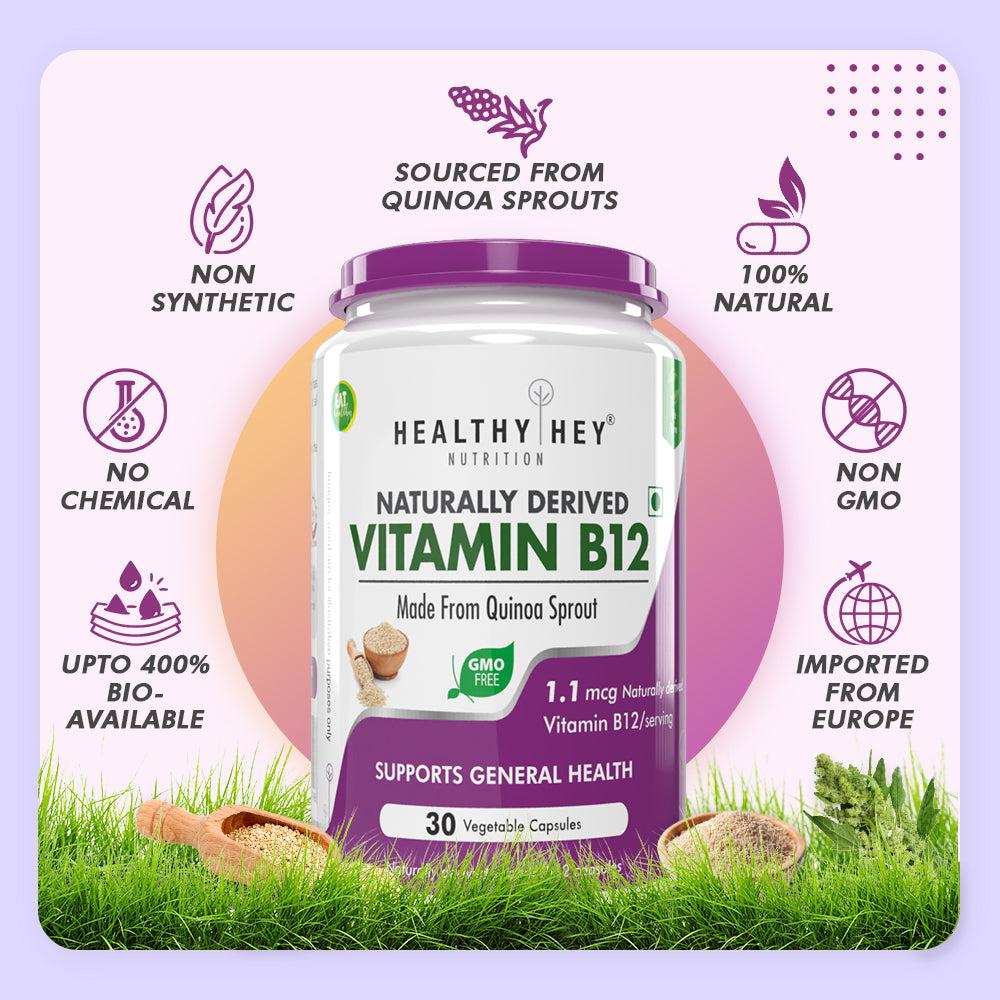
Kickstarting Your Journey with Vitamin B12
Why Vitamin B12 is a Game-Changer for Your Health
Vitamin B12, also known as cobalamin, plays a crucial role in various bodily functions, making it an essential nutrient for overall health. Scientific research has highlighted its significance in the development and function of the central nervous system, healthy red blood cell formation, DNA synthesis, and cellular energy production. Furthermore, vitamin B12 is vital for maintaining DNA stability and promoting cellular reprogramming and tissue regeneration.
The role of Vitamin B12 in your body
Vitamin B12 is required for the development, myelination, and function of the central nervous system. It also contributes to healthy red blood cell formation and DNA synthesis.
Common signs of Vitamin B12 deficiency
Deficiency in vitamin B12 can lead to adverse health effects such as decreased normal red blood cell production (anemia), impaired oxygen delivery, cognitive impairment, and potential risk of dementia in the elderly.
The Basics of Vitamin B12 Supplements
When considering vitamin B12 supplements, it's important to understand that they come in various forms such as cyanocobalamin or methylcobalamin. These supplements are available as tablets, sublingual preparations (placed under the tongue until dissolved), nasal sprays, or injections. While there are claims that certain forms may have better absorption rates than others, studies have not shown significant differences. It's advisable to consult a healthcare provider to determine the right supplement and dosage based on individual needs.
Different forms of Vitamin B12 supplements
Supplements and fortified foods contain vitamin B12 in its free form for easier absorption. They are available over-the-counter as single-nutrient supplements or as part of multivitamin and vitamin B-complex supplements.
How to choose the right supplement for you
Consider factors such as dosage levels, absorption methods (oral or sublingual), and potential interactions with other medications when selecting a vitamin B12 supplement. Consulting a healthcare provider can provide personalized guidance on choosing the most suitable option.
Incorporating vitamin B12 into your daily routine can significantly impact your overall well-being by addressing potential deficiencies and supporting essential bodily functions.
Unpacking the Best Time to Take Vitamin B12 Supplement

Now that you understand the significance of vitamin B12 and the various forms of supplements available, let's delve into the best time to take your vitamin B12 supplement to maximize its health benefits.
Morning Glory: Starting Your Day on the Right Note
Have you ever considered kickstarting your day with a dose of Vitamin B12? Research shows that Vitamin B-12 may increase energy and give you a sense of well-being. Taking your vitamin B12 supplement in the morning can provide an energy boost, setting a positive tone for your day. Additionally, it is advisable to consume methylcobalamin (a form of Vitamin B12) on an empty stomach for better absorption. This means that taking it in the morning before breakfast can optimize its absorption into your system.
The science behind Vitamin B12 absorption on an empty stomach
When taken on an empty stomach, Vitamin B12 is more readily absorbed by the body. People normally secrete 1.4 µg/day of B12 into their small intestines via their bile. By taking it in the morning before consuming any food, you allow for optimal absorption as there are no other nutrients competing for uptake.
Timing is Everything: Vitamin B12 and Your Meals
While taking Vitamin B12 in the morning is beneficial for absorption and energy levels, it's also important to consider timing in relation to meals. The optimal gap between meals and Vitamin B12 supplementation is crucial for maximizing its effectiveness. It's generally recommended to wait at least 30 minutes after taking your supplement before consuming any food or beverages other than water.
The optimal gap between meals and Vitamin B12 supplementation
Research has shown that high homocysteine levels are linked with a higher incidence of Alzheimer’s disease, dementia, and cognitive decline. To prevent this, spacing out your Vitamin B12 intake from meals can help maintain balanced homocysteine levels.
Foods to avoid when taking your Vitamin B12 supplement
It's important to be mindful of certain foods that may interfere with Vitamin B12 absorption. Avoid consuming high-calcium foods such as dairy products or calcium-fortified juices around the same time as your supplement, as calcium competes with B12 for absorption.
By strategically incorporating Vitamin B12 into your daily routine, especially in the morning on an empty stomach, you can optimize its absorption and harness its potential benefits for enhanced well-being.
Maximizing Absorption: Tips and Tricks

Now that you've gained insights into the significance of Vitamin B12 and the best time to take your supplements, let's explore some tips and tricks to maximize the absorption of this essential nutrient.
The Battle of Absorption: Vitamin B12 vs. Calcium
Why calcium can hinder Vitamin B12 absorption
Calcium plays a crucial role in bone health and muscle function, but it can also interfere with the absorption of Vitamin B12. High levels of calcium can compete with B12 for uptake in the body, potentially reducing the amount of B12 available for absorption. This competition highlights the importance of managing your calcium intake in relation to your Vitamin B12 supplementation.
How to schedule your calcium intake around your Vitamin B12 supplement
To optimize Vitamin B12 absorption, consider scheduling your calcium intake at a different time than your B12 supplement. Separating the consumption of high-calcium foods or supplements from your Vitamin B12 dose by a few hours can help minimize potential interference and ensure effective absorption of both nutrients.
Enhancing Your Vitamin B12 Intake
The role of water in maximizing Vitamin B12 absorption
Staying hydrated is key to optimizing the absorption of Vitamin B12. Adequate water intake supports overall digestive health, ensuring that nutrients are effectively absorbed into the bloodstream. When taking your Vitamin B12 supplement, be sure to drink a full glass of water to aid in its dissolution and subsequent absorption.
Additional lifestyle tips for better Vitamin B12 absorption
Incorporating certain lifestyle practices can further enhance the uptake of Vitamin B12. Regular physical activity promotes healthy digestion and metabolism, which can positively impact nutrient absorption. Additionally, maintaining a balanced diet rich in fruits, vegetables, lean proteins, and whole grains provides essential co-factors that support optimal nutrient assimilation.
By understanding how various factors influence Vitamin B12 absorption and implementing these practical tips, you can maximize the benefits of your supplementation routine for improved overall well-being.
Wrapping Up: Your Path to Enhanced Well-being with Vitamin B12
Recap: The Ideal Vitamin B12 Routine
In summary, establishing an ideal Vitamin B12 routine is essential for promoting overall well-being. By incorporating vitamin B12 into your daily regimen, you can significantly reduce the risk of depression, cognitive impairment, and dementia. Research has shown a clear link between Vitamin B12 intake and improved biomarkers associated with neurological health. While the evidence suggests a positive association between vitamin B12 intake and these health outcomes, it's important to acknowledge the limitations in studies reporting on this relationship.
Beyond Supplements: A Holistic Approach to Health
In addition to supplementation, adopting a holistic approach to health is crucial for maximizing the benefits of Vitamin B12. A balanced diet rich in lean proteins, fruits, vegetables, and whole grains provides essential co-factors that support optimal nutrient assimilation. Furthermore, regular check-ups with healthcare providers can help monitor your Vitamin B12 levels and ensure that any deficiencies are promptly addressed.
Encouragement to start and maintain a healthy Vitamin B12 routine is vital for long-term well-being. By staying proactive about your nutritional needs and overall health, you can harness the full potential of Vitamin B12 for enhanced vitality and cognitive function.

